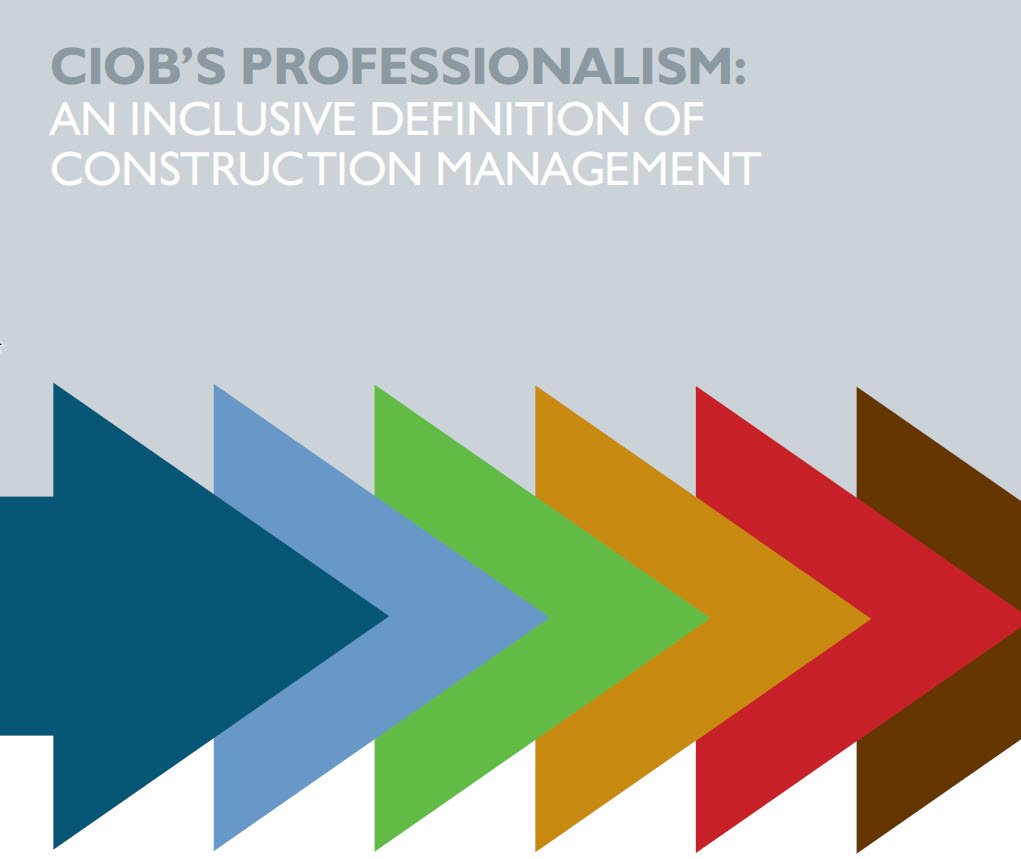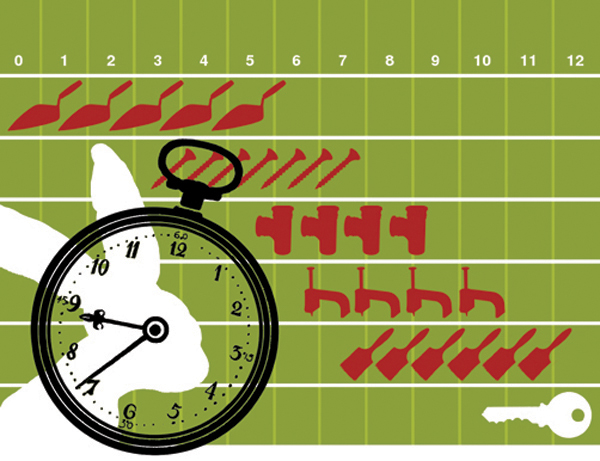Location:
PMKI > IT
& Construction Industries > CIOB.


- CIOB Contributions
- The CIOB Time and Cost Management
Contract Suite
- CIOB Construction Management Training
- Useful External Web-links &
Resources.
Other related sections of the PMKI:
- Construction Management
- BIM Technologies
Chartered Institute of Building has been represented in Australia (CIOBA) for many years, see P. Weaver's role. CIOB celebrated its 190th anniversary in 2024 and was invited to perform the official welcome at the start of the two-day PC Expo event in 2024. For more on CIOB Read the opening PPT.
 Construction
Management: Management of the development,
conservation and improvement of the built environment;
exercised at a variety of levels from the site and
project, through the corporate organizations of the
industry and its clients, to society as a whole; embracing
the entire construction value stream from inception to
recycling, and focusing on a commitment to sustainable
construction; incorporating a wide range of specialist
services; guided by a system of values demonstrating
responsibility to humanity and to the future of our
planet; and informed, supported and challenged by an
independent academic discipline.
Construction
Management: Management of the development,
conservation and improvement of the built environment;
exercised at a variety of levels from the site and
project, through the corporate organizations of the
industry and its clients, to society as a whole; embracing
the entire construction value stream from inception to
recycling, and focusing on a commitment to sustainable
construction; incorporating a wide range of specialist
services; guided by a system of values demonstrating
responsibility to humanity and to the future of our
planet; and informed, supported and challenged by an
independent academic discipline.
Prs: CIOB’s Contribution to the Effective Management of Time in Construction Projects (new Complex Projects Contract). This paper outlines the major advances in the practice of project planning and scheduling introduced by The Guide.
The need for good scheduling practice: The disastrous state of schedule practice in the construction industry is detailed in the report Managing the Risk of Delayed Completion in the 21st Century [or download the smaller executive summary]. Between December 2007 and January 2008, The Chartered Institute of Building (CIOB) conducted a survey of the construction industry’s knowledge and experience of different methods of project control, and time management, record keeping, monitoring and training. Their findings suggested there was a lot of work needed to achieve general 'best practice', unfortunately observation of general industry suggests the need is still as great today.
Time IS NOT Money. “Time is not money; with money you can put it on the table and you can see it, and if you leave it, it may even accumulate - whereas with time, you can’t see it or touch it. It expires at a regular and consistent rate whether you use it or not.” - Read the interview Time is NOT money', a conversation with Keith Pickavance for some background on Keith's assertion the 21st Century will be 'The Age of Time'.
Carbon Reduction
 The
CIOB’s Carbon Action 2050 working group published a
policy framework in 2011 that significantly influences the
approach of the UK construction industry and is still
relevant today. The Carbon Action 2050 toolkit is an
action plan of simple, practical steps that can be taken
by the Institute, its members, and the wider construction
industry to reduce carbon emissions from the built
environment.
The
CIOB’s Carbon Action 2050 working group published a
policy framework in 2011 that significantly influences the
approach of the UK construction industry and is still
relevant today. The Carbon Action 2050 toolkit is an
action plan of simple, practical steps that can be taken
by the Institute, its members, and the wider construction
industry to reduce carbon emissions from the built
environment.
See more on carbon reduction in the construction industry.
 The
Time and Cost Management Contract is a
revised edition of what was previously the CIOB’s Complex
Projects Contract, published in 2013. The name has been
changed to reflect more clearly the core strengths of the
Contract. The Time and Cost Management Contract
is written for use with the Time and Cost Management
Contract suite’s Subcontract and Consultancy Appointment
to provide a uniform approach to time cost and risk
management from initiation to completion of building and
engineering projects.
The
Time and Cost Management Contract is a
revised edition of what was previously the CIOB’s Complex
Projects Contract, published in 2013. The name has been
changed to reflect more clearly the core strengths of the
Contract. The Time and Cost Management Contract
is written for use with the Time and Cost Management
Contract suite’s Subcontract and Consultancy Appointment
to provide a uniform approach to time cost and risk
management from initiation to completion of building and
engineering projects.
Use of the contract
The Contract is most suitable for those projects which cannot be effectively managed intuitively and which require for their success a more scientific approach to time and cost risk management than is usual on more simple projects. The Contract can be used by companies, public authorities and private individuals in the UK and in any other country requiring the Contractor to build only from a design prepared under the direction of the Employer, or for the Contractor to design the Works in whole or in part. The Contract can be used for:
Pricing
The Contract can be used with any method of pricing. Commonly, these include fixed price, target cost, measured term, fixed fee, cost reimbursement, partnering and alliancing. The required method of pricing is to be described in the Special Conditions.
Special Conditions
The standard documentation is expected to be supplemented by Special Conditions setting out the method of pricing, insurance requirements, bonding and any other matter peculiar to the particular project for which it is used. The Special Conditions take priority over these standard conditions.
Specification
The standard documentation is expected to be supplemented by a Contract Specification identifying the standards of performance required for the particular project.
Time Management
The Contract requires competence in critical path network modelling, resource allocation and productivity analysis. The Working Schedule is required to be in differing densities updated and revised on the rolling wave principle that constantly predicts the currently attainable completion date, sectional completion dates and key dates.
Cost Management
Cost management is by reference to the values attributed to the activities in the Working Schedule with progress updated from progress records held in a database. The updated working schedule constantly predicts the out-turn cost of the Works and the value of work done to date.
Risk Management
The Contract is a collaborative contract requiring the Contractor, its Subcontractors and the design Consultants to work with the Time Manager, Cost Manager, Contract Administrator and the Employer to constantly appraise risk and to confer in taking practical action to overcome and avoid unnecessary consequences of time and cost risks. The Time Manager is required to collaborate with the Contractor, Subcontractors and Consultants. The Contract contains power to instruct acceleration both to overcome the effects of a delay to progress and bring forward completion dates where practical.
Collaboration
The Contract requires a collaborative approach to design in conformity with British Standards Institution’s BS 1192:2007, but goes further in expressly requiring the Contractor and all Subcontractors and Consultants having a continuing role in design, administration or quality control during the Works to participate in decision making, quality control, time management, cost management and risk management.
Building Information Modelling (BIM)
The Contract is suitable for Level 2 Projects 1 and the collaborative production of information throughout the project life cycle. It is compatible with the requirements of the British Standards Institution’s PAS 1192: Part 2, 2013 “Specification for information management for the capital/delivery phase of construction projects using building information modelling” and it may be used with any desired Building Information Modelling protocol.
Information Transfer
The Contract requires information to be transferred electronically either by readable file or in native file format and in accordance with a File Transfer Protocol compatible with the British Standards Institution’s PAS 1192:4 2014 COBie.
These ideas still have a lot to offer in the design of effective contracts.
Mosaic's training and this PMKI library are focused on project
management. The CIOB Academy is our recommended
resource for construction management resources. The
Academy publishes a mix of industry relevant webinars,
videos, and written materials (many free of charge) to aid
with your professional development. To see what's
available visit: https://www.ciobacademy.org/
The Chartered Institute of Building (CIOB). the world's largest and most influential professional body for construction management and leadership: https://www.ciob.org/about
Constructing Excellence - CE (UK) aims to achieve a step change in construction productivity by tackling the market failures and promoting continuous improvement: http://www.constructingexcellence.org.uk
IACCM - The International Association for Contract & Commercial Management world-class standards in contracting and relationship management process and skills: https://www.iaccm.com Publishes the IACCM Capability Maturity Model to benchmark contracting processes: https://www.iaccm.com/services/contracting-capability-maturity-assessment/
ICPMA - The International Construction Project Management Association (ICPMA) is an international umbrella association focusing on international Knowledge Management, the General Annual Meeting, working groups and publications: http://www.icpma.net
Major Projects Knowledge Hub (UK). Brings together learning, innovation and good practice from many different sources such as learning legacies by major projects, other related knowledge hubs and websites: https://www.majorprojectsknowledgehub.net
Strategic Forum for Construction (SFfC) UK. SFfC brings together the organisations representing the UK construction sector to work collaboratively for a better industry: http://www.strategicforum.org.uk/